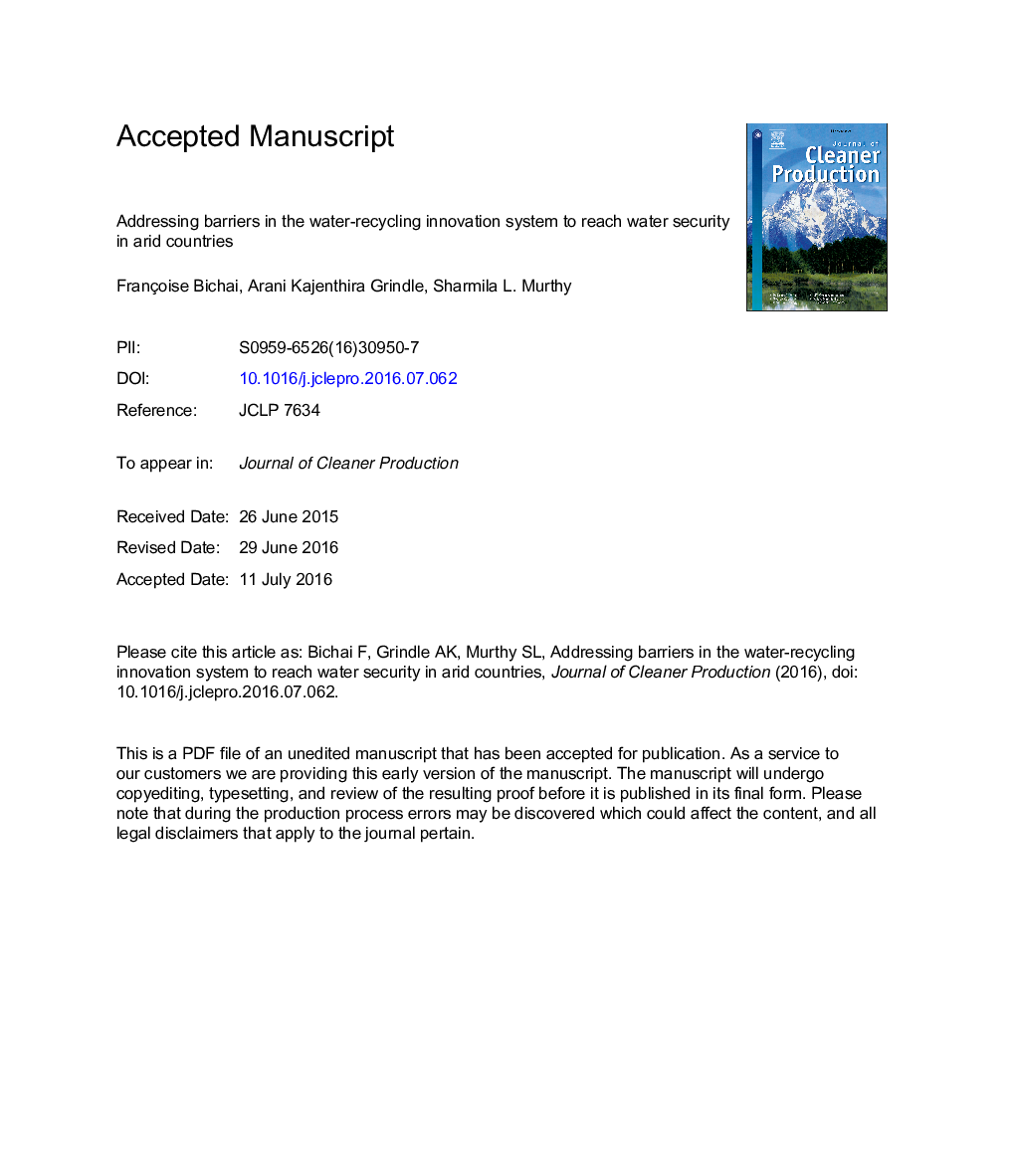| کد مقاله | کد نشریه | سال انتشار | مقاله انگلیسی | نسخه تمام متن |
|---|---|---|---|---|
| 8100437 | 1522083 | 2018 | 39 صفحه PDF | دانلود رایگان |
عنوان انگلیسی مقاله ISI
Addressing barriers in the water-recycling innovation system to reach water security in arid countries
ترجمه فارسی عنوان
رسیدگی به موانع در سیستم نوآوری آب بازیابی برای دستیابی به امنیت آب در کشورهای خشک
دانلود مقاله + سفارش ترجمه
دانلود مقاله ISI انگلیسی
رایگان برای ایرانیان
کلمات کلیدی
نوآوری تکنولوژیک، دینامیک سیستم، پایداری، بازیافت آب، استفاده مجدد از فاضلاب، امنیت آب،
موضوعات مرتبط
مهندسی و علوم پایه
مهندسی انرژی
انرژی های تجدید پذیر، توسعه پایدار و محیط زیست
چکیده انگلیسی
As arid regions face increasing pressures on their water resources, the challenge of securing an adequate supply of good quality water to meet growing demands calls for innovative approaches that involve a diversification of water supply options and improved management of wastewater. Water recycling is a disruptive innovation that can help to achieve this goal in arid countries if the appropriate technical and institutional barriers are broken down. Within the water innovation literature, key questions remain as to the nature of the process and of the temporal dynamics of a shift towards decentralized wastewater infrastructure. This study offers insights into these mechanics using the Framework for Analyzing a Multi-level Innovation System (FAMIS), a cross-sectoral model that draws on the theories of technological innovation systems, system dynamics, transitions of socio-technical regimes, and evolutionary theories of technology. Cases from three water-scarce countries with distinct political economies-Australia, the United Arab Emirates (U.A.E.) and Jordan-were used to document the dynamics of innovation in the water recycling system and identify policy solutions. Despite important contextual differences, in the three cases examined, actors and institutions have dynamically interacted to create a small niche where water recycling has emerged as a viable technology. Yet the application of the FAMIS model revealed that the dominant regime of water management has not been fundamentally altered due to blockages mainly at two “stages” of the FAMIS innovation lifecycle: the selection and adoption stages. We identified cross-geographical socio-technical and environmental characteristics and common mechanisms that strongly influence the evolution of water recycling technology through the innovation system. We find that the water-recycling technology evolves into the later stages of the innovation system in Australia, with the chokepoint occurring most importantly within the sophisticated but fragmented institutions that regulate water recycling. In the U.A.E., while agricultural reuse is widespread (to a larger extent than in Australia), major barriers occur earlier in the system, leaving mainly the water recycling technologies in the early stages of the system, where policy-induced path dependency block most selection mechanisms. With a wider infrastructural and institutional gap, Jordan may actually face less stringent barriers to water-recycling developments throughout all stages of the innovation system, namely influenced by international donors. Policy recommendations derived from this work to address barriers at the selection and adoption stages include favoring a coordinated institutional long-term vision and planning to overcome path dependence, enhancing social acceptance and adequate implementation of laws and regulations, and supporting data acquisition and model developments to build a stronger business case for water recycling.
ناشر
Database: Elsevier - ScienceDirect (ساینس دایرکت)
Journal: Journal of Cleaner Production - Volume 171, Supplement, 10 January 2018, Pages S97-S109
Journal: Journal of Cleaner Production - Volume 171, Supplement, 10 January 2018, Pages S97-S109
نویسندگان
Françoise Bichai, Arani Kajenthira Grindle, Sharmila L. Murthy,
